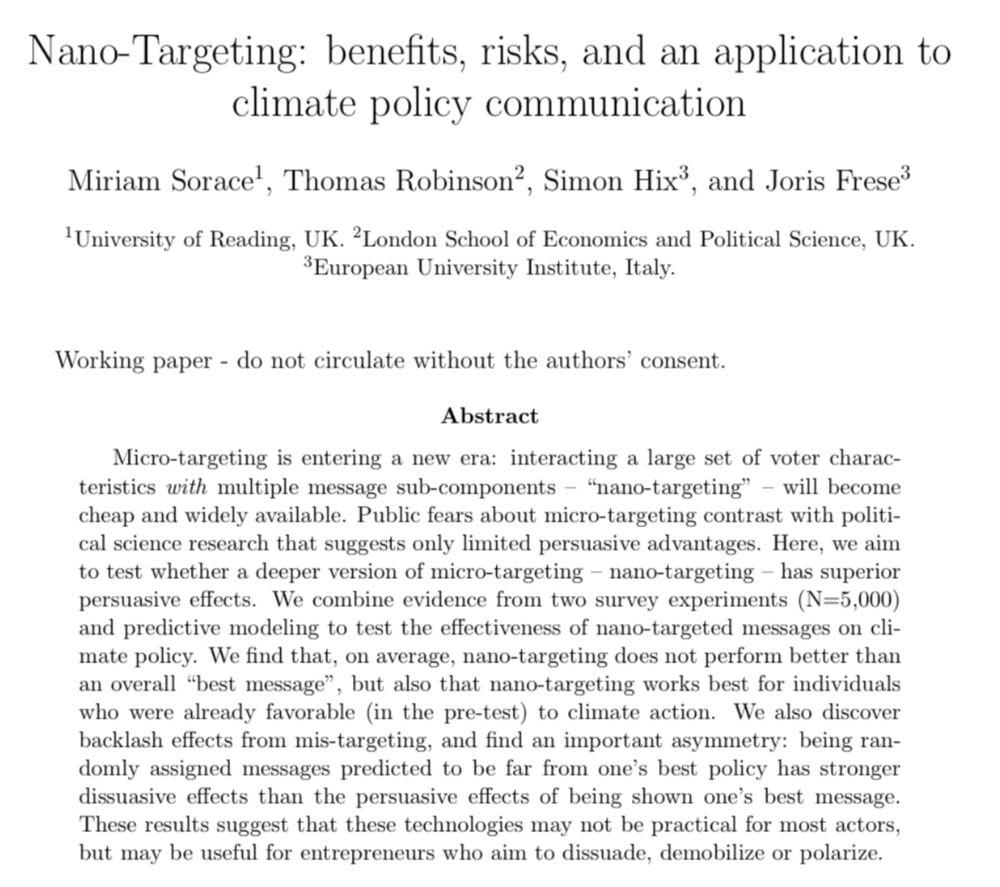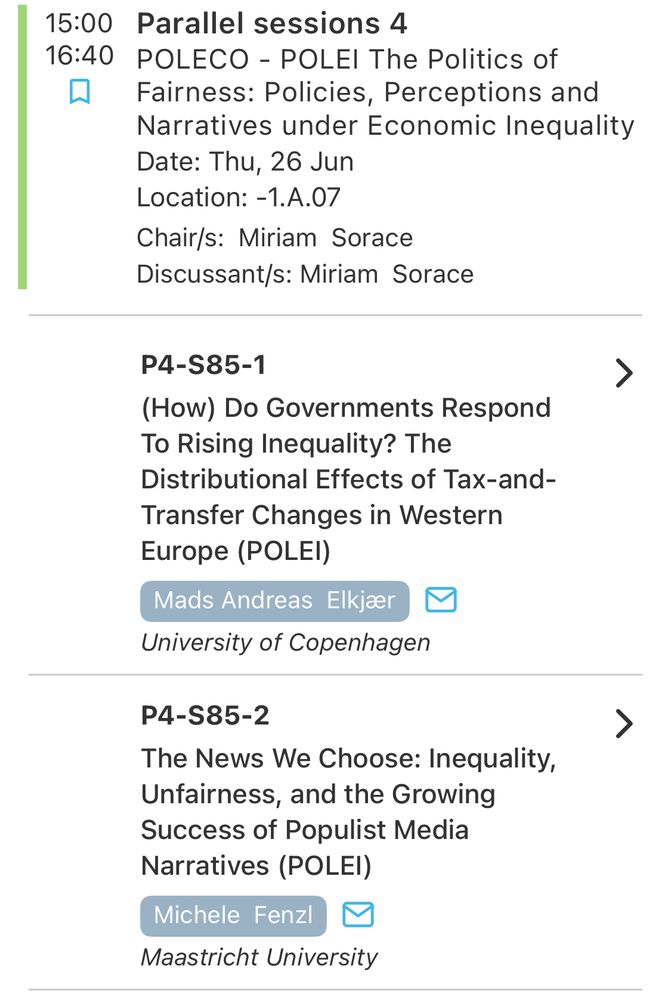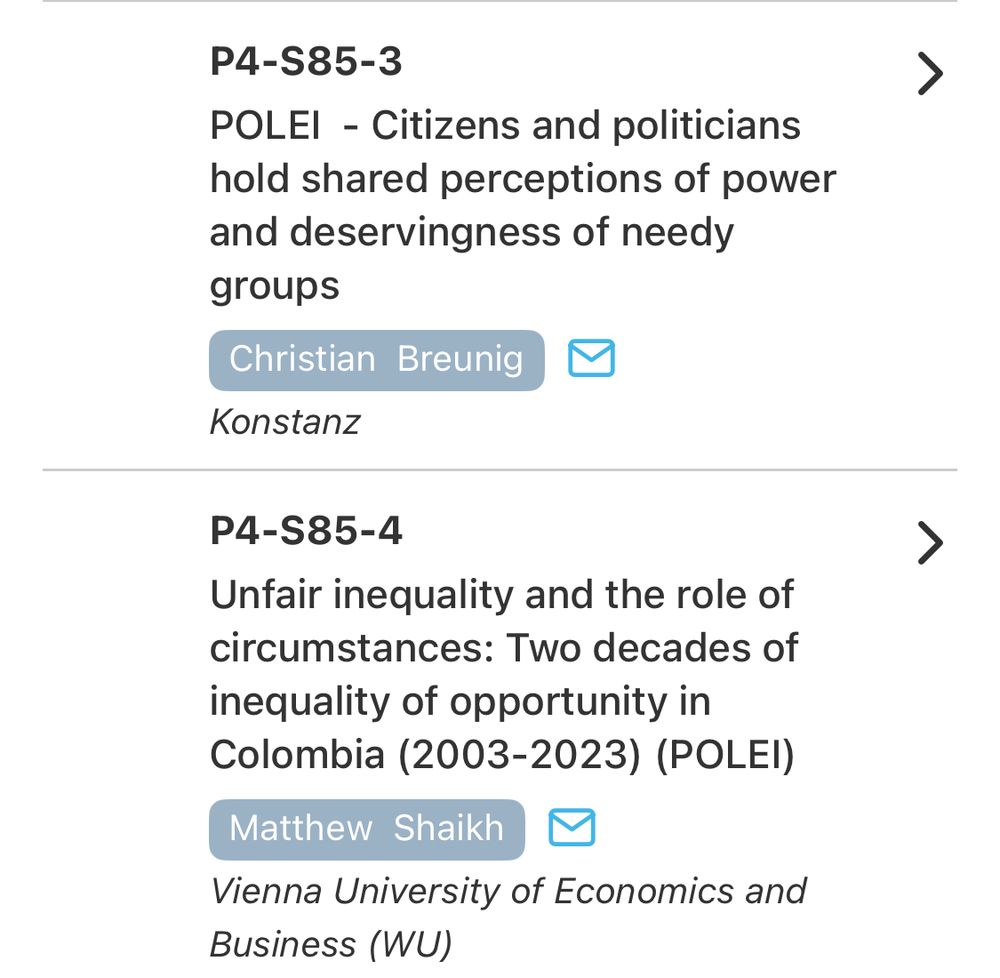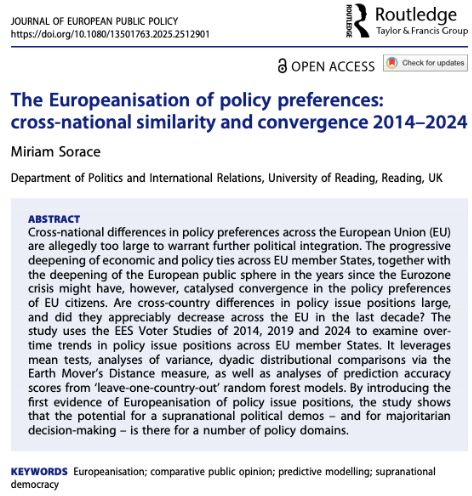Miriam Sorace
@miriamsorace.bsky.social
Associate Professor in Comparative Politics - University of Reading; Co-Director @poalab.bsky.social; UKRI Future Leaders Fellow;
Visiting: DSI-London School of Economics. Web: https://miriamsorace.github.io
Visiting: DSI-London School of Economics. Web: https://miriamsorace.github.io
Most-disliked messages had stronger dissuasive effects than most-liked messages had persuasive ones – suggesting nano-targeting may be more effective for dissuasion and de-mobilization than persuasion.

October 16, 2025 at 7:45 AM
Most-disliked messages had stronger dissuasive effects than most-liked messages had persuasive ones – suggesting nano-targeting may be more effective for dissuasion and de-mobilization than persuasion.
Uniquely, our study does not simply test the persuasive effects of nano-targeting, but also its polarizing and dissuasive effects. We found that nano-targeting exacerbates polarization: nano-targeting was most persuasive among already pro-climate respondents and not among the undecideds/moderates.

October 16, 2025 at 7:45 AM
Uniquely, our study does not simply test the persuasive effects of nano-targeting, but also its polarizing and dissuasive effects. We found that nano-targeting exacerbates polarization: nano-targeting was most persuasive among already pro-climate respondents and not among the undecideds/moderates.
We find that – on all our measures of persuasion – the nano-targeted group **never** out-performs the best climate message outlined above (i.e. positive + energy security frames; tax incentives on sustainable buildings, energy and trade; investment in sustainable transport and farming)

October 16, 2025 at 7:45 AM
We find that – on all our measures of persuasion – the nano-targeted group **never** out-performs the best climate message outlined above (i.e. positive + energy security frames; tax incentives on sustainable buildings, energy and trade; investment in sustainable transport and farming)
For phase two (message testing), we partnered with @opiniumresearch.bsky.social to randomly assign respondents to: nano-targeted messages, the best-performing climate message, or a control condition where each individual received a bespoke but non-targeted climate policy message.

October 16, 2025 at 7:45 AM
For phase two (message testing), we partnered with @opiniumresearch.bsky.social to randomly assign respondents to: nano-targeted messages, the best-performing climate message, or a control condition where each individual received a bespoke but non-targeted climate policy message.
We then nano-target by training a predictive model (xgboost) on first-phase conjoint data, predicting petition support by interacting policy components with individual demographics, past vote and vote intention.

October 16, 2025 at 7:45 AM
We then nano-target by training a predictive model (xgboost) on first-phase conjoint data, predicting petition support by interacting policy components with individual demographics, past vote and vote intention.
The calibration stage – run with @yougov.co.uk - shows that the best climate policy messaging has an optimistic frame and highlights energy security benefits, proposes tax incentives on sustainable buildings, trade and renewable energy and investment on the transport and natural investment sector.

October 16, 2025 at 7:45 AM
The calibration stage – run with @yougov.co.uk - shows that the best climate policy messaging has an optimistic frame and highlights energy security benefits, proposes tax incentives on sustainable buildings, trade and renewable energy and investment on the transport and natural investment sector.
Delighted to feature in the latest issue of Political Insight! My piece describes how data-driven campaigning works in practice, challenges the dystopian narratives surrounding it, and outlines key safeguards to ensure that these techniques enhance - rather than undermine - democracy.

September 16, 2025 at 12:13 PM
Delighted to feature in the latest issue of Political Insight! My piece describes how data-driven campaigning works in practice, challenges the dystopian narratives surrounding it, and outlines key safeguards to ensure that these techniques enhance - rather than undermine - democracy.
I am also presenting (Fri 13:10) joint work with @simonhix.bsky.social @fresejoris.bsky.social and Thomas Robinson on nano-targeting methods 4 climate protection persuasion campaigns, where we found some alarming patterns … Looking forward to all the wonderful #EPSA2025 panels!!


June 25, 2025 at 2:43 PM
I am also presenting (Fri 13:10) joint work with @simonhix.bsky.social @fresejoris.bsky.social and Thomas Robinson on nano-targeting methods 4 climate protection persuasion campaigns, where we found some alarming patterns … Looking forward to all the wonderful #EPSA2025 panels!!
Cannot wait for my organised panel on economic and political inequalities tomorrow - with contributions from @madselk.bsky.social @mfenzl.bsky.social @breunig.bsky.social and Matthew Shaikh - if you’re interested in the politics of inequality do join us!! #EPSA2025


June 25, 2025 at 2:36 PM
Cannot wait for my organised panel on economic and political inequalities tomorrow - with contributions from @madselk.bsky.social @mfenzl.bsky.social @breunig.bsky.social and Matthew Shaikh - if you’re interested in the politics of inequality do join us!! #EPSA2025
Out now🎉 - Evidence (from distribution analyses and machine learning models on EES 2014-2024 data) of strong similarities and growing convergence in EU public opinion, particularly on economic issues. Common right-ward shifts on immigration, yes - but underlying drivers still vary. shorturl.at/KCx0S

June 20, 2025 at 2:04 PM
Out now🎉 - Evidence (from distribution analyses and machine learning models on EES 2014-2024 data) of strong similarities and growing convergence in EU public opinion, particularly on economic issues. Common right-ward shifts on immigration, yes - but underlying drivers still vary. shorturl.at/KCx0S
@eui-eu.bsky.social writing paradise 😍

February 24, 2025 at 10:22 AM
@eui-eu.bsky.social writing paradise 😍
Using EES 2014, 2019 and 2024 waves - the plot shows how for most policy positions (0-10 scales, where 10 is most right-wing) '24 has registered right-ward shifts. Environment/climate issue reversal from 2019 particularly notable. #EES24challenge

November 5, 2024 at 8:30 AM
Using EES 2014, 2019 and 2024 waves - the plot shows how for most policy positions (0-10 scales, where 10 is most right-wing) '24 has registered right-ward shifts. Environment/climate issue reversal from 2019 particularly notable. #EES24challenge
@sarahobolt.bsky.social kicking off the discussion #EES24Premiere @eesresearch.bsky.social @rhulpirp.bsky.social @gbenedetto.bsky.social EES24 will be available to the community v soon - stay tuned!

October 15, 2024 at 4:27 PM
@sarahobolt.bsky.social kicking off the discussion #EES24Premiere @eesresearch.bsky.social @rhulpirp.bsky.social @gbenedetto.bsky.social EES24 will be available to the community v soon - stay tuned!






